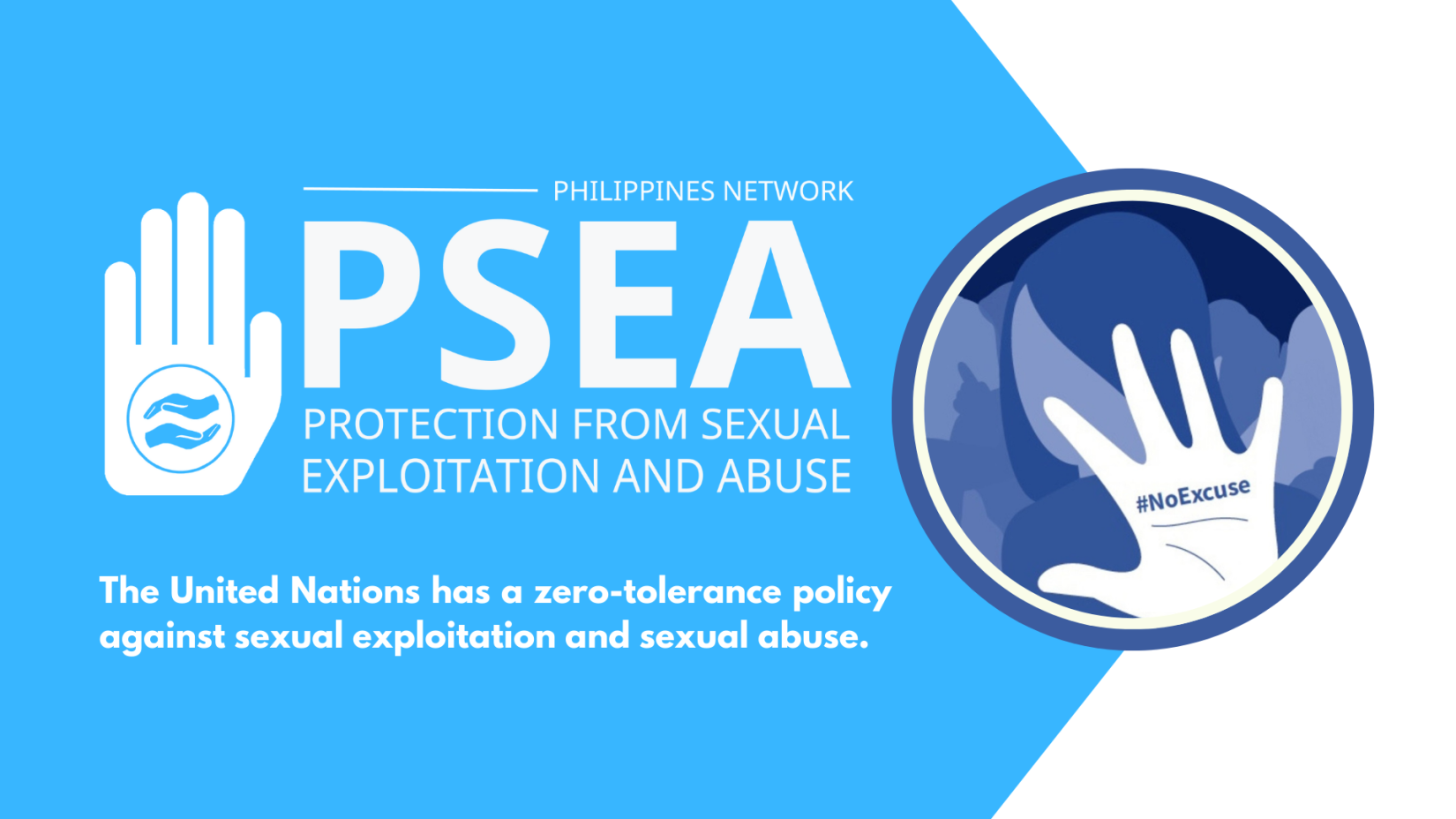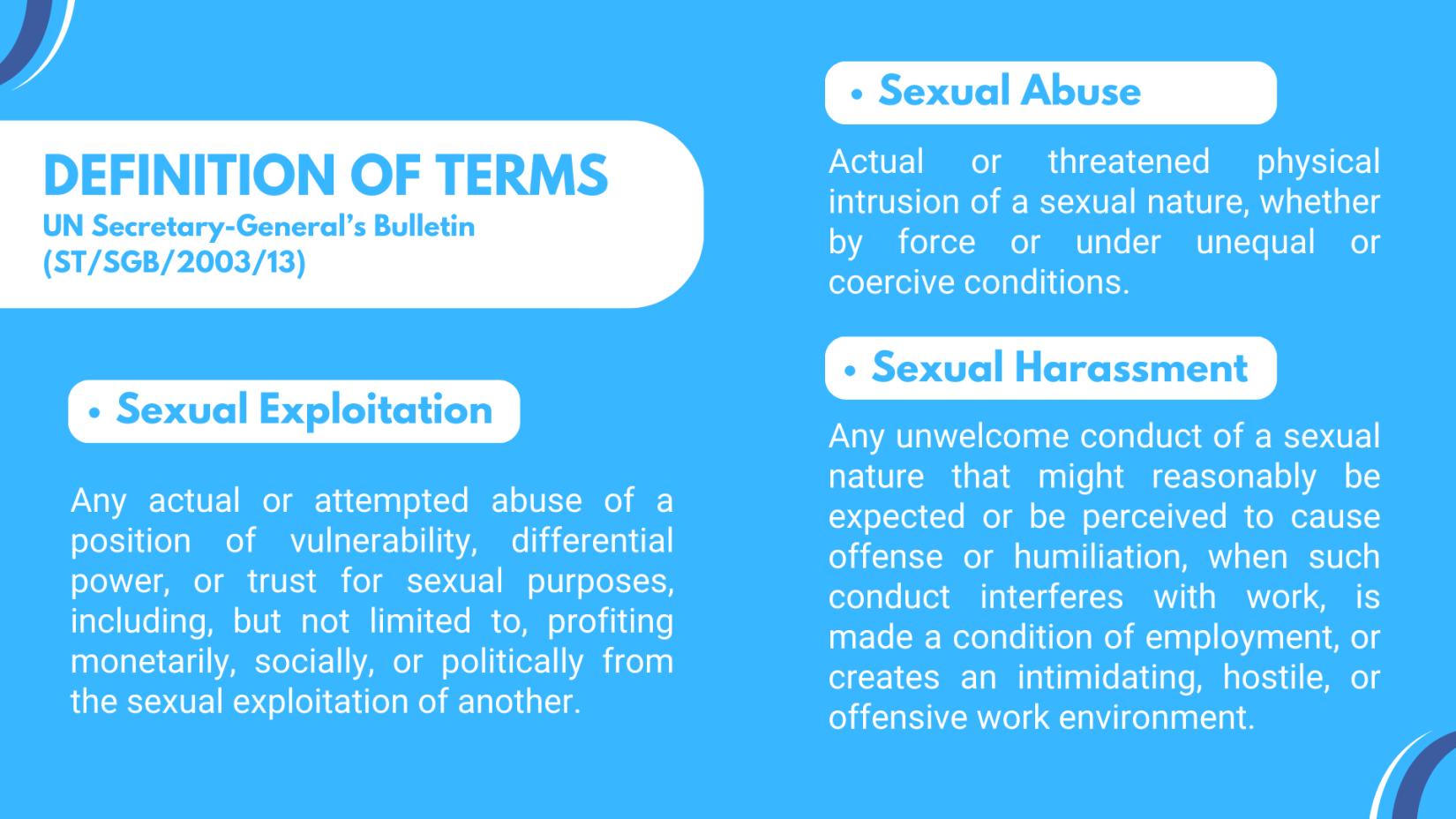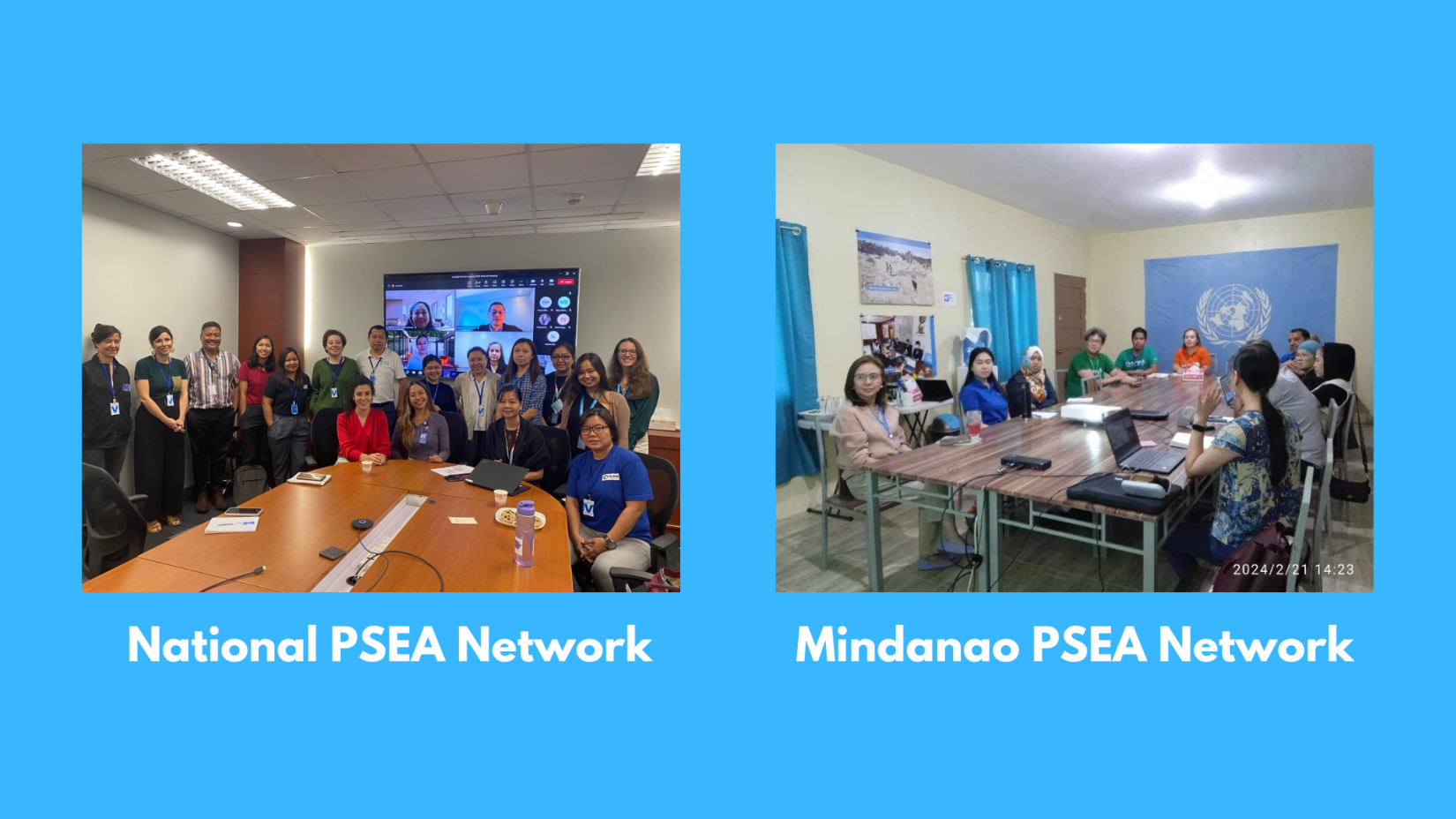Protection from Sexual Exploitation and Abuse (PSEA)

ABOUT THE PSEA NETWORK
Protecting and safeguarding the rights of the communities we serve, especially the members who are most vulnerable, such as women, children, youth, and people with disabilities, is a core tenet of development, humanitarian, and peacebuilding work. This includes protecting these vulnerable groups from all forms of sexual exploitation and abuse (SEA), especially at the hands of development and aid workers. Such abuses are a violation of human rights and an abuse of the power and influence granted by their perceived status within the communities they work in.
The United Nations Country Team (UNCT) and the Humanitarian Country Team (HCT) are committed to strengthening the country's efforts on Protection from Sexual Exploitation and Abuse (PSEA). Under the leadership of the Resident and Humanitarian Coordinator, the Philippines Inter-Agency PSEA Network was established to systematize and synchronize the development sector’s efforts to address SEA. The Network is co-chaired by United Nations agencies and a civil society organization (CSO). For 2024-2025, the Co-Chairs are the International Organization for Migration (IOM), the World Food Programme (WFP) and Plan International Pilipinas.
The PSEA Network is focused on building and increasing the internal capacities of its members to meet and implement the minimum PSEA operating standards, and on building partnerships with other stakeholders, such as the government, local CSOs, private sector, and donors for the integration and institutionalization of PSEA in programming and operations.
A PSEA Communications Strategy is under development to coordinate and effectively communicate PSEA principles and key information to the communities served by the PSEA Network’s members. The strategy is a key first step in boosting awareness and understanding of SEA reporting channels.
At present, the PSEA Network meets every month at the national level, while a dedicated sub-group composed of Mindanao-based agencies meets every other month. The UN/Inter-Agency PSEA Coordinator acts as the Convenor and Secretariat. All members of the UNCT and HCT are de facto members of the Network, which at present has a membership of 29 UN agencies and 32 CSOs.
REPORTING CHANNELS
Your vigilance and responsibility are key in maintaining a safe and respectful environment for everyone. If you witness or suspect any incidents of sexual exploitation or abuse, please report it immediately—your action can make a difference.
The information received will be treated with the utmost confidentiality. Confidential information will only be shared when informed consent is given, and only when necessary for the purposes of investigation and providing professional support to the complainant/victim.
Philippines Inter Agency PSEA Network
- Email: psea.philippines@humanitarianresponse.info
- Mobile: 0917-8157375

RELEVANT RESOURCES
1. Videos released by UN Resident/Humanitarian Coordinator
- Message of RC Arnaud Peral to all UN Staff/Personnel (Feb 2025)
- Message of RC Gustavo Gonzalez to all UN Staff/Personnel (Jan 2024)
2. PSEA Network’s Technical Documents
- 2024-2025 PSEA Network’s Terms of Reference
- 2024 PSEA Action Plan
- 2025 PSEA Action Plan
- 2025-2028 Philippines PSEA Strategy Plan
- 2024 PSEA Network Logos
- 2024 Standard Operating Procedures for Sexual Exploitation and Abuse (SOPs for SEA)
- Directory of NGO PSEA Focal Points
- Directory of UN PSEA Focal Points
- Directory of SEA Reporting Channels Among PSEA Network Members
- SEA Reporting Form
3. PSEA Network’s Knowledge Products
- 2023 BARMM SEA Risk Register
- PSEA Quick Guides for Humanitarian
- a. PSEA Checklist for Emergency Preparedness and Anticipatory Action
- b. PSEA Checklist for Emergency Response and Anticipatory Action
- c. PSEA Network’s Emergency Plan
- d. Guidance on Integrating PSEA Within the Humanitarian Programme Cycle
- e. Checklist for Integrating PSEA in the Earthquake Contingency Plan
- PSEA Network Training Package
4. PSEA Network’s Learning Exchange Sessions
2024
- Webinar: Use of the UN Harmonized Assessment Tool to Understand the PSEA Core Standards
Dates: February 29, 2024 ; March 1, 2024 - Learning Exchange Session: Differentiating Sexual Exploitation and Abuse from Sexual Harassment
Date: April 18, 2024 - Brown Bag: Feedback from Communities
Date: May 28, 2024 - Brown Bag: PSEA in Peacebuilding
Date: August 16, 2024; August 20, 2024 - Learning Exchange Session: Orientation on the HRS and MDS by CHS Alliance
Date: October 25, 2024 - Webinar: Application of the Victim-Centered Approach
Date: November 12, 2024 - Webinar: PSEA Disability Inclusion
Date: November 15, 2024
2025
- Webinar: Understanding the Safe Spaces Act (RA11313) and Its Linkage to PSEA
Date: January 27, 2025 - Brown bag: Orientation on the Standard Operating Procedures for SEA
Date: February 21, 2025 - Webinar: Step-by-Step Guide for Aid Workers in Dealing with a SEA/GBV Victim/Survivor
Date: February 25, 2025 - Webinar: What Aid Workers Should Know in Reporting and Responding to Child Sexual Exploitation and Abuse
Date: March 20, 2025 - Webinar: Basic Psychological First Aid
Date: April 24, 2025 - Webinar: Accountability to Affected Populations
Date: May 29, 2025 - Training: PSEA Capacity Assessment for NGO Implementing Partners
Date: June 19, 2025 - Webinar: Gender Transformative Approaches
Date: June 26, 2025 - Webinar: Misconduct Disclosure Scheme (MDS)
Date: August 4, 2025 - Webinar: Safety and Security Tips and Practices for the Well-Being of Aid Workers
Date: August 6, 2025 - Webinar: Government and NGO SHEA investigation policies and practices
Date: September 29, 2025 - Webinar: Disability Inclusive PSHEA
Date: October 27, 2025

6. PSEA Network Communication Materials
- PSEA Roll-up Tarpaulins
- PSEA Communication Materials for Communities
7. PSEA Network General Documents
8. PSEA Capacity Assessment Tools for IPs
9. UN Philippines Documents with PSEA
10. Global References for PSEA
- IASC Guidance Note on Inter-Agency SEA Referral Procedures
- PSEA Focal Point Generic Terms of Reference
- Practical Toolkit for UN Senior Leaders on PSEA
- 2025 PSEA Action Plan Template and Guidance (for Inter-Agency)
- Video on PSEA Introduction - Tagalog (c/o Interaction)
- Video on PSEA Introduction – English (c/o Interaction)
- Practical step-by-step guide for Humanitarian Coordinators (HC) and Humanitarian Country Teams (HCT) Aug 2024
11. Other Related Links
